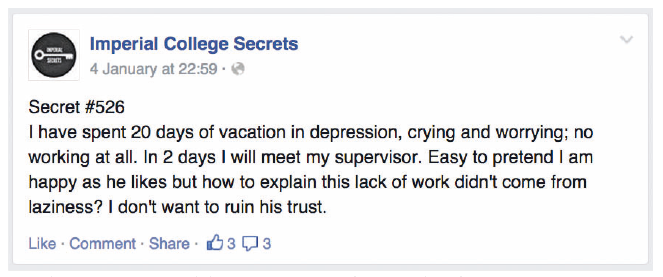It’s time for action on mental illness
Why are university students still so afraid to admit they need help?

I’ve never been a good writer, and have never before written for Felix. However, I have lately felt a strong desire to write, as a voice for those who may be suffering in silence.
Throughout the last couple of months, and up to the turn of 2015, a small but highly significant number of people I have become acquainted with revealed that they have been suffering from mental health problems, in one form or another. These shocking stories are often revealed in personalised narratives to friends, via Facebook, after a long period of silence. I daresay, those who are brave enough to do so represent only a minority.
Why does it take people so long to tell someone that they need help? And what about those who have never told anyone? The reason is people are scared. People are afraid that they will be judged. People are fearful of being labelled as ‘mad’ or ‘not normal’. The consequences and stigma associated with mental illness lead to many people preferring the option to suffer in silence. They should not be. After all, we all have different personalities. Our experiences shape our individual selves. Therefore university students should not be afraid to speak out.
Without support from college, and a caring community, however, people with mental health problems find it difficult to cope with the pressures and demands of university. Having been high-achievers all their whole life, they are advised to take a year or more out of this environment to recover. As a result, they are kept away from their close friends, and indeed their friends may have graduated by the time they are well enough to resume education, which poses an additional difficulty.
The truth is that mental illnesses are commoner than people think, especially in an intense environment that strives for academic excellence, where competition between peers can be a contributing factor. People with mental illnesses may never fully recover, despite the best medicines and talking therapy. Their condition can relapse unexpectedly. Mental illnesses are unpredictable, much like the British weather!
Mental illness sufferers are vulnerable. They are more likely to become victims of physical, sexual, or drug abuse. The chances of this are further aggravated by an unsupportive or unknowing college community.
The same goes for students whose chronic physical health problems cause them to experience an interruption in their studies. People with chronic physical illnesses may develop mental health problems in the long term.
In this New Year, there ought to be actions taken by the student body to address this matter of concern. Mental Health Awareness Week is only the start of a long road ahead. Imperial College students should embrace colleagues with mental illnesses and support their study at university. It is time to break the silence.









